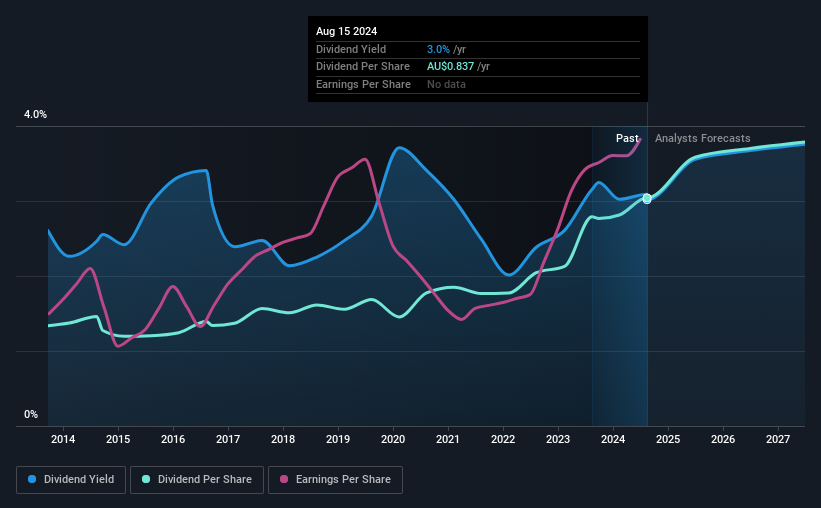The board of Computershare Limited (ASX:CPU) has announced that it will be paying its dividend of $0.42 on the 16th of September, an increased payment from last year's comparable dividend. This takes the annual payment to 3.0% of the current stock price, which unfortunately is below what the industry is paying.
See our latest analysis for Computershare
Computershare's Dividend Is Well Covered By Earnings
Even a low dividend yield can be attractive if it is sustained for years on end. Before making this announcement, Computershare's dividend was higher than its profits, but the free cash flows quite comfortably covered it. Given that the dividend is a cash outflow, we think that cash is more important than accounting measures of profit when assessing the dividend, so this is a mitigating factor.
The next year is set to see EPS grow by 50.7%. Under the assumption that the dividend will continue along recent trends, we think the payout ratio could be 71% which would be quite comfortable going to take the dividend forward.

Dividend Volatility
The company has a long dividend track record, but it doesn't look great with cuts in the past. Since 2014, the dividend has gone from $0.244 total annually to $0.554. This works out to be a compound annual growth rate (CAGR) of approximately 8.6% a year over that time. It's good to see the dividend growing at a decent rate, but the dividend has been cut at least once in the past. Computershare might have put its house in order since then, but we remain cautious.
The Dividend's Growth Prospects Are Limited
With a relatively unstable dividend, it's even more important to evaluate if earnings per share is growing, which could point to a growing dividend in the future. Although it's important to note that Computershare's earnings per share has basically not grown from where it was five years ago, which could erode the purchasing power of the dividend over time. So the company has struggled to grow its EPS yet it's still paying out 104% of its earnings. Limited recent earnings growth and a high payout ratio makes it hard for us to envision strong future dividend growth, unless the company should have substantial pricing power or some form of competitive advantage.
Our Thoughts On Computershare's Dividend
Overall, we always like to see the dividend being raised, but we don't think Computershare will make a great income stock. In the past, the payments have been unstable, but over the short term the dividend could be reliable, with the company generating enough cash to cover it. This company is not in the top tier of income providing stocks.
Companies possessing a stable dividend policy will likely enjoy greater investor interest than those suffering from a more inconsistent approach. Still, investors need to consider a host of other factors, apart from dividend payments, when analysing a company. As an example, we've identified 2 warning signs for Computershare that you should be aware of before investing. If you are a dividend investor, you might also want to look at our curated list of high yield dividend stocks.
Mobile Infrastructure for Defense and Disaster
The next wave in robotics isn't humanoid. Its fully autonomous towers delivering 5G, ISR, and radar in under 30 minutes, anywhere.
Get the investor briefing before the next round of contracts
Sponsored On Behalf of CiTechNew: AI Stock Screener & Alerts
Our new AI Stock Screener scans the market every day to uncover opportunities.
• Dividend Powerhouses (3%+ Yield)
• Undervalued Small Caps with Insider Buying
• High growth Tech and AI Companies
Or build your own from over 50 metrics.
Have feedback on this article? Concerned about the content? Get in touch with us directly. Alternatively, email editorial-team (at) simplywallst.com.
This article by Simply Wall St is general in nature. We provide commentary based on historical data and analyst forecasts only using an unbiased methodology and our articles are not intended to be financial advice. It does not constitute a recommendation to buy or sell any stock, and does not take account of your objectives, or your financial situation. We aim to bring you long-term focused analysis driven by fundamental data. Note that our analysis may not factor in the latest price-sensitive company announcements or qualitative material. Simply Wall St has no position in any stocks mentioned.
About ASX:CPU
Computershare
Provides issuer, corporate trust, employee share plans and voucher, communication and utilities, technology and operations, and mortgage and property rental services.
Solid track record with excellent balance sheet and pays a dividend.
Similar Companies
Market Insights
Weekly Picks

Early mover in a fast growing industry. Likely to experience share price volatility as they scale


A case for CA$31.80 (undiluted), aka 8,616% upside from CA$0.37 (an 86 bagger!).


Moderation and Stabilisation: HOLD: Fair Price based on a 4-year Cycle is $12.08
Recently Updated Narratives


Title: Market Sentiment Is Dead Wrong — Here's Why PSEC Deserves a Second Look


An amazing opportunity to potentially get a 100 bagger

Amazon: Why the World’s Biggest Platform Still Runs on Invisible Economics
Popular Narratives


Crazy Undervalued 42 Baggers Silver Play (Active & Running Mine)


MicroVision will explode future revenue by 380.37% with a vision towards success


NVDA: Expanding AI Demand Will Drive Major Data Center Investments Through 2026
Trending Discussion


